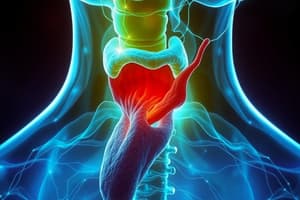Podcast
Questions and Answers
Which of the following is NOT a potential cause of growth failure that could lead to the use of Mecasermin?
Which of the following is NOT a potential cause of growth failure that could lead to the use of Mecasermin?
Which of the following is a potential side effect associated with the use of Mecasermin?
Which of the following is a potential side effect associated with the use of Mecasermin?
Which of the following is TRUE regarding the mechanism of action of Somatostatin?
Which of the following is TRUE regarding the mechanism of action of Somatostatin?
Which of the following is a characteristic of Cabergoline?
Which of the following is a characteristic of Cabergoline?
Signup and view all the answers
The text mentions that dopamine agonists can cause which of the following effects in normal healthy adults?
The text mentions that dopamine agonists can cause which of the following effects in normal healthy adults?
Signup and view all the answers
Which of the following is a potential side effect of Cabergoline, related to its interaction with serotonin receptors?
Which of the following is a potential side effect of Cabergoline, related to its interaction with serotonin receptors?
Signup and view all the answers
What is the primary role of rhIGFBP-3 in the drug Mecasermin rinfabate?
What is the primary role of rhIGFBP-3 in the drug Mecasermin rinfabate?
Signup and view all the answers
Which of the following statement(s) accurately describe(s) the action of GHRH?
Which of the following statement(s) accurately describe(s) the action of GHRH?
Signup and view all the answers
What condition is caused by a deficiency in growth hormone (GH)?
What condition is caused by a deficiency in growth hormone (GH)?
Signup and view all the answers
Which hormone is considered essential for mediating the actions of growth hormone?
Which hormone is considered essential for mediating the actions of growth hormone?
Signup and view all the answers
What is a common side effect of growth hormone therapy in adults?
What is a common side effect of growth hormone therapy in adults?
Signup and view all the answers
Which of the following conditions is NOT an indication for growth hormone use?
Which of the following conditions is NOT an indication for growth hormone use?
Signup and view all the answers
How does growth hormone primarily exert its effects on tissues?
How does growth hormone primarily exert its effects on tissues?
Signup and view all the answers
What is one of the direct metabolic effects of growth hormone on the body?
What is one of the direct metabolic effects of growth hormone on the body?
Signup and view all the answers
Which of the following statements about IGF-1 receptors is true?
Which of the following statements about IGF-1 receptors is true?
Signup and view all the answers
Which patient population has shown to tolerate growth hormone therapy best?
Which patient population has shown to tolerate growth hormone therapy best?
Signup and view all the answers
Which somatostatin analog is administered intramuscularly once a month?
Which somatostatin analog is administered intramuscularly once a month?
Signup and view all the answers
What is the common mechanism of action for somatostatin analogs?
What is the common mechanism of action for somatostatin analogs?
Signup and view all the answers
What is a common side effect of somatostatin analog therapy?
What is a common side effect of somatostatin analog therapy?
Signup and view all the answers
Which of the following medications is a GH receptor antagonist?
Which of the following medications is a GH receptor antagonist?
Signup and view all the answers
What is a potential complication of long-term use of somatostatin analogs?
What is a potential complication of long-term use of somatostatin analogs?
Signup and view all the answers
Which hormone is derived from pro-opiomelanocortin (POMC)?
Which hormone is derived from pro-opiomelanocortin (POMC)?
Signup and view all the answers
Which of the following best describes the common causes of hyperprolactinemia?
Which of the following best describes the common causes of hyperprolactinemia?
Signup and view all the answers
What is the primary role of hypothalamic releasing hormones?
What is the primary role of hypothalamic releasing hormones?
Signup and view all the answers
What is the primary neurotransmitter that regulates prolactin release?
What is the primary neurotransmitter that regulates prolactin release?
Signup and view all the answers
Which medications are primarily used to reduce elevated prolactin levels?
Which medications are primarily used to reduce elevated prolactin levels?
Signup and view all the answers
Which hormone is NOT classified as a glycoprotein hormone?
Which hormone is NOT classified as a glycoprotein hormone?
Signup and view all the answers
Which of the following describes the action of growth hormone (GH)?
Which of the following describes the action of growth hormone (GH)?
Signup and view all the answers
Corticotropin-releasing hormone (CRH) is released from which part of the body?
Corticotropin-releasing hormone (CRH) is released from which part of the body?
Signup and view all the answers
What is the significance of the hypothalamic-adenohypophyseal portal system?
What is the significance of the hypothalamic-adenohypophyseal portal system?
Signup and view all the answers
Which of the following hormones is primarily responsible for stimulating milk production?
Which of the following hormones is primarily responsible for stimulating milk production?
Signup and view all the answers
Which hormone is released in response to stress and stimulates the adrenal glands?
Which hormone is released in response to stress and stimulates the adrenal glands?
Signup and view all the answers
Study Notes
Pharmacology of Anterior Pituitary
- Anterior pituitary hormones are classified into three groups:
- Pro-opiomelanocortin (POMC) derived hormones (ACTH, α-melanocyte-stimulating hormone (α-MSH), LH, FSH, hCG, TSH, will be covered elsewhere)
- Somatotropic hormones (GH and PRL)
- Glycoprotein hormones
Learning Objectives
- Students will be able to identify and describe various hormones secreted by the anterior pituitary gland.
- Students will be able to identify and describe the mechanisms of action of agents used to treat GH deficiency and overproduction in adults and children.
- Students will be able to identify and describe the adverse effects of agents used to treat GH and prolactin deficiency or hypersecretion in adults and children.
- Students will be able to identify and describe the indications for use of GH, mecasermin/mecasermin rinfibate.
Background
- The anterior pituitary hormones can be classified into three groups: including POMC, somatotropic, and glycoprotein hormones.
Treatments for GH deficiency
- Growth Hormone (GH) deficiency causes dwarfism, while excess causes acromegaly
- GH affects almost all tissues of the body.
- GH has direct effects on lipid and carbohydrate metabolism.
- Somatomedins (insulin-like growth factor-1 [IGF-1]) mediate GH's growth-promoting effects.
- IGF-1 synthesis increases when GH binds to its receptor, thus allowing for cell differentiation and proliferation.
- Somatropin: used to stimulate growth in GH deficiency cases (such as Prader-Willi, Turner syndrome, and AIDS).
Indications for use of GH
- GH deficiency treatment
- Pediatric patients with short stature (Prader-Willi syndrome, Turner syndrome, idiopathic short stature)
- Wasting in patients with AIDS
- Patients with short bowel syndrome
Side effects of GH
- Potential side effects in adults are greater than in children
- Pancreatitis, gynaecomastia, carpal tunnel syndrome, CYP450 induction, peripheral edema, myalgias, and arthralgias
- Increased risk of asphyxiation in severely obese patients with Prader-Willi syndrome and airway obstruction.
- Care with diabetic patients on insulin therapy.
- Increased blood sugar levels (hyperglycemia)
Mecasermin/Mecasermin rinfabate
- Mecasermin is rhIGF-1 alone.
- Mecasermin rinfabate is a complex of rhIGF-I and recombinant human insulin-like growth factor-binding protein-3 (rhIGFBP-3).
- rhIGFBP-3 significantly increases the circulating half-life of rhIGF-I.
- Indications for use: severe IGF-I deficiency in children with growth failure
Treatments for GH excess (acromegaly)
- Dopamine agonists (Bromocriptine, Cabergoline):
- Dopamine agonists can be given orally.
- Can cause side effects such as dizziness, headache, lightheadedness, nausea, vomiting, and abdominal pain
- Warning: Cabergoline is associated with valvular heart disease.
Somatostatin (SST) analogs
- Used to treat GH excess (acromegaly)
- Act as agonists at somatostatin receptors.
- Side effects: GI disturbances (diarrhea, nausea, abdominal cramps, malabsorption, flatulence), which typically resolve within 2 weeks. SST analogs also inhibit CCK release and gallbladder motility, predisposing patients to cholelithiasis.
GH receptor antagonists
- Pegvisomant:
- A genetically engineered GH derivative that fails to activate GH receptors, inhibiting IGF-1 production
- Side effects: injection site pain, nausea, diarrhea and elevation of hepatic aminotransferase concentrations.
Hyperprolactinemia
- Hyperprolactinemia is a state of persistent elevated prolactin levels
- Common causes are prolactinomas, dopamine antagonists (antidepressants, antipsychotics), and contraceptives.
- Treatment: Bromocriptine, Cabergoline (dopamine agonists).
Studying That Suits You
Use AI to generate personalized quizzes and flashcards to suit your learning preferences.
Related Documents
Description
This quiz covers the pharmacology related to hormones secreted by the anterior pituitary gland. Students will learn to identify and describe various hormones, their mechanisms of action, and the adverse effects of treatments for growth hormone issues. It aims to solidify understanding of hormone classifications and clinical applications.




